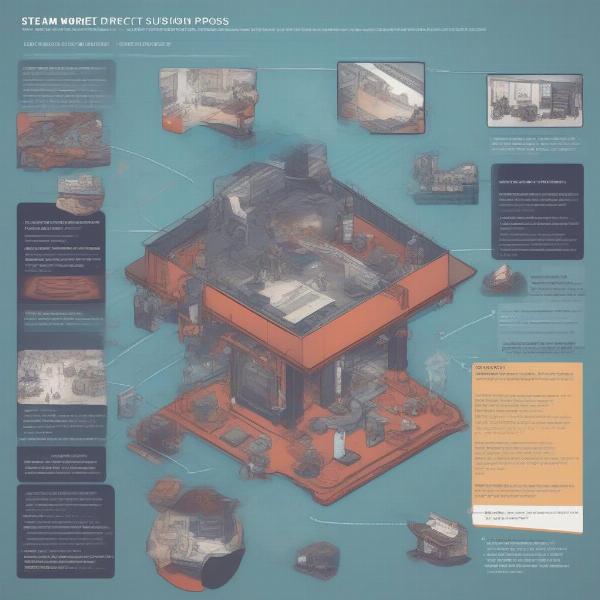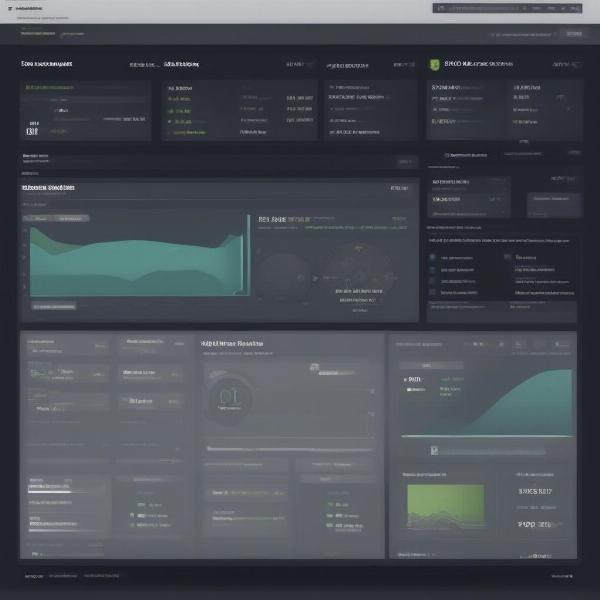Are you a game developer or publisher wondering, “How Can I Sell Games On Steam”? At supremeduelist.blog, we understand the challenges of navigating the digital marketplace. Steam, a dominant force in PC gaming, offers a direct route to millions of gamers, but launching and selling a game successfully requires careful planning and execution. This guide provides a detailed roadmap for anyone looking to sell their games on Steam. We will cover everything from initial requirements to promotional strategies.
This article aims to give a comprehensive overview of the process of listing and selling your game on the Steam platform. We will explain the technical requirements and business aspects. By the end of this guide, you should have a clear understanding of what’s needed to bring your game to market and how to maximize its potential for success.
Understanding the Steam Direct Process
Selling games on Steam isn’t as simple as uploading your game files. Steam uses a program called Steam Direct which requires a few steps that include paying fees and going through verification. The process ensures quality and helps maintain the integrity of the Steam store. The first step is to establish a Steamworks account. This is the gateway for accessing Steam’s publishing tools, and it’s where the process of getting your game onto the store begins.
Setting Up Your Steamworks Account
To begin, you’ll need to register on the Steamworks website. This will require your business information, banking details, and tax identification information. Steam requires this information to ensure that payments for your game can be made legally and efficiently. After you register, there will be a small payment to use Steam Direct, this fee was introduced to minimize low quality games.
Game Requirements for Steam
Once your account is active, the next step is to prepare your game for submission. Steam has specific requirements for game builds and metadata. This includes game artwork, video trailers, screenshots, and detailed descriptions. Your game build must be stable and bug-free to pass quality control. Steam will review your game to ensure it meets these standards. Make sure to test your game thoroughly before submission. Also, having a detailed development log can assist in this process.
 steam-direct-game-submission-process
steam-direct-game-submission-process
Pricing Your Game Effectively
One of the key aspects of selling on steam, is understanding pricing strategies. The pricing you choose will directly impact your sales figures, and you will have the chance to set regional prices, which is important for maximizing sales in different global markets. A balance between competitive pricing and the perceived value of your game is essential. Consider the genre, development costs, and the market you’re targeting when setting your prices.
Sales and Promotions
Steam provides tools for discounting your game during specific sale periods and events. Participating in these sales events can significantly boost your visibility and sales. There are large seasonal events, like the Summer and Winter sales, along with smaller themed sales. Making your game available during these periods is important, and the use of coupons and bundles can also help to drive sales volume. Promotions also include marketing efforts within and outside the Steam platform.
How do you promote your game?
Promoting your game on steam can involve multiple strategies. Creating engaging trailers, using social media and connecting with influencers is important. Building a community around your game can also play a key role, and maintaining a blog or Discord server is something to consider. “Building a strong community is essential,” explains game marketing expert, Elena Ramirez. “Engagement and feedback loops can drive sales and improve your game.”
Legal and Financial Considerations
Before you fully launch, it is important to fully understand the legal and financial aspects of selling games on steam. Your sales will be subject to Valve’s revenue sharing agreement. Understanding payment processes, tax obligations and any regional legal requirements is crucial. Ensure you’re compliant with all applicable laws to avoid any potential issues with your sales. You also need to clearly define your game’s refund policy in compliance with Steam’s guidelines.
Understanding Steam’s Revenue Share
Steam operates under a revenue share model where Valve takes a percentage of your game’s revenue. This percentage can vary based on the revenue your game generates over time, for larger titles it is often in the region of 30%. The rest will go directly to the developer or publisher. There are no upfront costs for listing a game on Steam aside from the Steam Direct fee. However, it’s important to consider these costs when calculating profit margins and setting your pricing strategy.
Payment Processes and Taxes
Steam provides several payout methods that may be adjusted based on your country of origin. You will need to understand your local tax laws, as there could be international taxes. Consulting a legal or financial expert is often a good idea for making sure you remain in compliance. Keeping clear records of your sales data is important for accurate accounting. This will be useful for tax purposes and managing your business finances.
Managing Your Game After Launch
The launch of your game is not the end. Ongoing management and continuous development are key for long-term success on Steam. Responding to player feedback, releasing updates, and implementing bug fixes is critical for customer satisfaction and maintaining player interest. “The post-launch phase is just as important as the pre-launch,” says veteran game developer, David Chen. “Listening to the community and constantly improving your game will keep players engaged.”
Player Feedback and Community Engagement
Actively participating in your game’s community helps retain and grow your player base. Engaging on Steam discussion boards and social media will allow you to directly address player concerns and understand issues. Positive community engagement can increase player loyalty and improve your game’s reputation. It may also open opportunities to gain new ideas and directions for future content.
Game Updates and Maintenance
Regular updates and patches are crucial for fixing bugs and adding new content. Addressing player concerns through frequent updates will keep your game playable and engaging. The best game developers will keep working on their game over time. Consistent updates will create a good perception for your company and ensure a long lifetime for your game.
 steam-game-launch-management-dashboard
steam-game-launch-management-dashboard
Avoiding Common Pitfalls
Selling games on Steam, similar to many other business ventures can have some pitfalls to avoid. One common mistake is insufficient testing and launching with bugs. Another mistake is neglecting community engagement. Also failing to market your game effectively can result in low sales. “Many developers underestimate the importance of marketing,” adds industry analyst, Sarah Williams. “A great game needs a great marketing strategy.” It is important to understand the market you are selling into, and understand the demands of your genre.
Underestimating Marketing Efforts
The steam store front can be a very busy place. Without proper marketing, your game may not gain visibility. Investing in promotional materials, social media campaigns, and influencer outreach is essential to reach a wide audience. Consider having a clear message and brand to make your game stand out from others, as well as a clear content strategy. A unique selling point will help your game stand out.
Neglecting Player Feedback
Another common mistake is not responding to player feedback. Failing to address bugs or player concerns may damage your game’s reputation. Engage with your community, use their feedback to improve your game, and be transparent about the fixes you are doing. Communication is key for developing and maintaining an active player base, and can increase your games life cycle. Remember that positive interaction will attract more players.
How do I get a game on Steam?
Getting a game on Steam requires you to sign up with Steamworks, submit your game files, marketing material, and finally your banking and tax information. You can then pay for the Steam Direct fee, and your game will then be reviewed for quality.
Can you sell digital games?
Yes, you can absolutely sell digital games and can you sell digital games on platforms like Steam, Itch.io, and GOG. Many games are exclusively sold digitally, offering players convenience.
Does Steam take away your games?
This is an important question many people ask. Steam does not generally take games away from you, but they can, and you should be aware of the conditions under which it can occur. For example, can steam take away your games, if there is a violation of their terms of service. This is a rare occurrence however, and the general assumption is that they are yours to play, so long as you have an active account.
Are there alternatives to Steam?
Yes, there are alternatives to Steam for selling games. Some popular options include the Epic Games Store, GOG, Itch.io, and directly from your own website. Each platform has its own benefits and drawbacks.
What kind of games can I sell on Steam?
You can sell most types of games on Steam, as long as they meet the platform’s quality guidelines and are not illegal. Common genres include RPGs, strategy games, platformers, and many more. Steam allows for most games as long as they have not broken Steam’s rules, or are illegal.
Conclusion
Selling games on Steam can be a rewarding experience for game developers and publishers. Understanding the Steam Direct process, pricing strategies, legal considerations, and community engagement is critical for success. Remember that it is a competitive landscape, so preparation and understanding is important. By diligently following the steps outlined in this guide, you can maximize the potential of your game on Steam. To gain more insights into the world of gaming, keep checking back to supremeduelist.blog, your ultimate source for game analysis and strategies. Start your journey to get your game on Steam today!
Leave a Reply